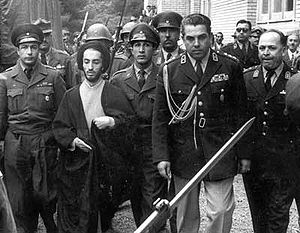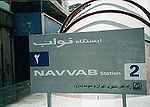
Navvab Safavi
Encyclopedia

Fadayan-e Islam
Fadā'iyān-e Islam , was an Iranian Islamic fundamentalist secret society founded in 1946, by a 21 year-old theology student named Navvab Safavi. Safavi sought to purify Islam in Iran by ridding it of `corrupting individuals` by means of carefully planned assassinations of certain leading...
group and with them the assassination of several leading Iran
Iran
Iran , officially the Islamic Republic of Iran , is a country in Southern and Western Asia. The name "Iran" has been in use natively since the Sassanian era and came into use internationally in 1935, before which the country was known to the Western world as Persia...
ians, primarily politicians.
Early life
Born in Khānīābād (southern TehranTehran
Tehran , sometimes spelled Teheran, is the capital of Iran and Tehran Province. With an estimated population of 8,429,807; it is also Iran's largest urban area and city, one of the largest cities in Western Asia, and is the world's 19th largest city.In the 20th century, Tehran was subject to...
), Safavi studied in Najaf
Najaf
Najaf is a city in Iraq about 160 km south of Baghdad. Its estimated population in 2008 is 560,000 people. It is the capital of Najaf Governorate...
, Iraq
Iraq
Iraq ; officially the Republic of Iraq is a country in Western Asia spanning most of the northwestern end of the Zagros mountain range, the eastern part of the Syrian Desert and the northern part of the Arabian Desert....
and worked in Abadan
Abadan
Abadan is a city in and the capital of Abadan County, Khuzestan Province, Iran. It lies on Abadan Island , from the Persian Gulf, near the Iraqi-Iran border. The civilian population of the city dropped to near zero during the eight-years Iran–Iraq War. In 1992, only 84,774 had returned to live...
's petroleum installations in the province of Khuzestan for a while. He is said to have been known for his striking looks and his "mesmerizing" speaking ability.
Career
He founded the Fadayan-e IslamFadayan-e Islam
Fadā'iyān-e Islam , was an Iranian Islamic fundamentalist secret society founded in 1946, by a 21 year-old theology student named Navvab Safavi. Safavi sought to purify Islam in Iran by ridding it of `corrupting individuals` by means of carefully planned assassinations of certain leading...
organization in 1946, and began recruiting like-minded individuals. Like the Ikhwan (Muslim Brotherhood
Muslim Brotherhood
The Society of the Muslim Brothers is the world's oldest and one of the largest Islamist parties, and is the largest political opposition organization in many Arab states. It was founded in 1928 in Egypt by the Islamic scholar and schoolteacher Hassan al-Banna and by the late 1940s had an...
), Navvab-Safavi believed that Islamic society needed to be purified. To do this he organized carefully planned assassinations to rid Islam of "corrupting individuals," often prime ministers of Iran's government.
He is said to be "the man who introduced Ayatollah Khomeini
Ruhollah Khomeini
Grand Ayatollah Sayyed Ruhollah Musavi Khomeini was an Iranian religious leader and politician, and leader of the 1979 Iranian Revolution which saw the overthrow of Mohammad Reza Pahlavi, the Shah of Iran...
to the Muslim Brotherhood
Muslim Brotherhood
The Society of the Muslim Brothers is the world's oldest and one of the largest Islamist parties, and is the largest political opposition organization in many Arab states. It was founded in 1928 in Egypt by the Islamic scholar and schoolteacher Hassan al-Banna and by the late 1940s had an...
and their ideas," who "spent long hours together" with Khomeini in discussion, and visited him in Qom on a number of occasions during 1943 and 1944.
He and his organization were responsible for the assassinations, or attempted assassinations of politicians Abdolhosein Hazhir, Hossein Ala (he survived the attempt), Prime Minister Haj Ali Razmara
Haj Ali Razmara
Sepahbod Haj Ali Razmara was a military leader and Prime Minister of Iran....
, historian Ahmad Kasravi
Ahmad Kasravi
Ahmad Kasravi , was a notable Iranian linguist, historian, and reformer.Born in Hokmabad , Tabriz, Iran, Kasravi was an Iranian Azeri Initially, Kasravi enrolled in a seminary. Later, he joined the Iranian Constitutional Revolution...
, and Major General
Major General
Major general or major-general is a military rank used in many countries. It is derived from the older rank of sergeant major general. A major general is a high-ranking officer, normally subordinate to the rank of lieutenant general and senior to the ranks of brigadier and brigadier general...
Teymur Bakhtiar
Teymur Bakhtiar
Teymur Bakhtiar was an Iranian general and the founder and head of SAVAK from 1958 to 1961, when he was dismissed by the Shah. In 1970, SAVAK agents assassinated him in Iraq.-Early life:...
.
Safavi and his group were closely associated with Ayatollah Abol-Ghasem Kashani
Ayatollah Abol-Ghasem Kashani
Ayatollah Seyyed Abol-Ghasem Mostafavi Kashani was a prominent Twelver Shi'a Muslim cleric and former Parliament Speaker of Iran.-Early life:...
and supported but were not members of Mohammed Mosaddeq's National Front
National Front (Iran)
The National Front of Iran or Jebhe Melli is a Democratic, political opposition group founded by Mohammad Mossadegh and other secular Iranian leaders of Nationalist, Liberal, and Social-Democratic political orientation who had been educated in France in the late 1940s...
. Safavi worked with Kashani, helping organize bazaar strikes against Premier Ahmad Qavam, public meetings in support of Palestinian Arabs, and a violent demonstration in 1948 against Premier Abdolhossein Hazhir
Abdolhossein Hazhir
Abdolhosein Hazhir was a Prime Minister of Iran.He served as Minister 10 times, and eventually as Prime Minister.When serving as Minister of Royal Court , he was assassinated at the age of 50 by Sayyed Hosein Emami Esfahani, who was a member of Navab Safavi's militant organization in...
. When the Shah appointed National Front leader Dr. Mohammed Mossadegh to the post of prime minister, Safavi expected his objectives would be furthered. He demanded the government drive the British out, and that it release "with honor and respect" the assassin of Razmara. When that didn't happen, Safavi announced "We have broken away irrevocably from Kashani's National Front. They promised to set up an Islamic country according to the precepts of the Koran. Instead they have imprisoned our brothers." He later warned, "There are others who must be pushed down the incline to hell."
However relations between Kashani and Safavi, not to mention Mosaddeq, became "strained." On 10 May 1951, Navvab Safavi declared: 'I invite Musadizz, other members of the National Front and Ayatollah Kashani, to an ethical trial,`

Arrest and execution
Prime Minister Mosaddeq, who was preocupied with the nationalization of the oil industry, found these activities "disruptive." On June 8, 1951 he ordered the arrest of Safavi, who stayed there until his release in February 1953. Six months later Mosaddeq was overthrown in a coup d'étatCoup d'état
A coup d'état state, literally: strike/blow of state)—also known as a coup, putsch, and overthrow—is the sudden, extrajudicial deposition of a government, usually by a small group of the existing state establishment—typically the military—to replace the deposed government with another body; either...
. Like Kashani, Safavi supported the coup against Mosaddeq and "in the years immediately following the coup Navvab Safavi enjoyed a close association with the court and the government of Prime Minister General Fazlollah Zahedi
Fazlollah Zahedi
Mohammad Fazlollah Zahedi was an Iranian general and statesman who replaced democratically elected Iranian Prime Minister Mohammed Mossadeq through a western-backed coup d'état, in which he played a major role.-Early years:Born in Hamedan in 1897, Fazlollah Zahedi was the son of Abol Hassan...
." By 1955 it became clear the regime would not be instituting strict enforcement of Shariah law and Islamizing Iran, and was instead becoming more pro-Western. On 22 November, after an unsuccessful attempt to assassinate Hosein Ala, Navvab Safavi and some of his followers were arrested. Following a summary trial Safavi and three other members of Fadayan-e Islam
Fadayan-e Islam
Fadā'iyān-e Islam , was an Iranian Islamic fundamentalist secret society founded in 1946, by a 21 year-old theology student named Navvab Safavi. Safavi sought to purify Islam in Iran by ridding it of `corrupting individuals` by means of carefully planned assassinations of certain leading...
were executed on 25 December. The clerical establishment did not attempt to intervene on their behalf.
Legacy
The Islamic Republic of Iran considers him an Islamic hero and martyrMartyr
A martyr is somebody who suffers persecution and death for refusing to renounce, or accept, a belief or cause, usually religious.-Meaning:...
, and an expressway
Navvab Expressway
Shahid Navvab Safavi Expressway starts from Tohid Tunnel and it is Chamran Expressway renamed after passing the tunnel. It continues going south until it reaches the junction between Qale Morghi Expressway and Niruye Havaei Expressway. It is named after Navvab Safavi....
and metro stop are named after him in Tehran.

See also
- Fadayan-e IslamFadayan-e IslamFadā'iyān-e Islam , was an Iranian Islamic fundamentalist secret society founded in 1946, by a 21 year-old theology student named Navvab Safavi. Safavi sought to purify Islam in Iran by ridding it of `corrupting individuals` by means of carefully planned assassinations of certain leading...
- Pahlavi DynastyPahlavi dynastyThe Pahlavi dynasty consisted of two Iranian/Persian monarchs, father and son Reza Shah Pahlavi and Mohammad Reza Shah Pahlavi The Pahlavi dynasty consisted of two Iranian/Persian monarchs, father and son Reza Shah Pahlavi (reg. 1925–1941) and Mohammad Reza Shah Pahlavi The Pahlavi dynasty ...
- List of Prime Ministers of Iran
- History of fundamentalist Islam in IranHistory of fundamentalist Islam in IranThe history of fundamentalist Islam in Iran covers the history of Islamic revivalism and the rise of political Islam in modern Iran. Today, there are basically three types of Islam in Iran: traditionalism, modernism, and a variety of forms of revivalism usually brought together as fundamentalism...
External links
- Bio According to RajaNews (dead link)

